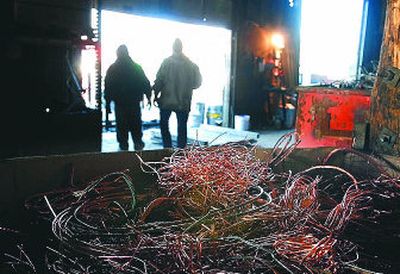Recyclers get stuck in middle of battle

Meth-using thieves desperate enough to risk death from high-voltage electrical wires and determined enough to rip a building apart for a bit of copper aren’t easily deterred.
But a broad coalition of electrical utilities, contractors and law enforcement organizations is betting most tweakers wouldn’t work so hard if metal theft didn’t pay.
What if metal recyclers were required to ask a lot more questions when someone pulls up with a pickup full of irrigation pipe? What if the recycler told the seller he’d have to give a valid address and wait 30 days for a check to be mailed?
A pair of bills pending in the Washington Legislature would do that and more.
“The legislators I have spoken to see tremendous value in deterring this sort of cash transaction,” said Collins Sprague, Avista’s Washington government relations manager.
“The methamphetamine problem is really at the heart of this, in conjunction with the greater value that certain metals like aluminum and copper have in the marketplace,” Sprague said. “And at the heart of that are scrap metal dealers.”
The Avista lobbyist is spearheading efforts to persuade the Legislature to make it much more difficult to peddle stolen metal – and to make stolen metals easier to recover by requiring scrap dealers to store their purchases for 30 days.
Sprague correctly predicted that scrap metal dealers “are just going to go ballistic” about having to store metals for a month to give victims and police a chance to recover stolen property.
“If that happens, most of the recyclers, I think, will have to close their doors,” said Hap Ahlborn, owner of Action Recycling in Spokane.
Recyclers don’t have – and can’t afford – warehouses big enough to sort and store incoming materials very long, Ahlborn said.
Charles Hepburn, owner of Bargain Town Metals in Moses Lake, agreed. Like Ahlborn, Hepburn also fears the proposal would leave recyclers at the mercy of volatile metal prices.
Pawn brokers and second-hand dealers already are required to hold incoming merchandise for a month, but jewelry and chain saw prices are relatively stable. Hepburn said top-grade copper going for $1.99 a pound as he spoke had been worth $2.54 a pound 10 days earlier.
Metal buyers also are sellers in a hierarchy that progresses from small towns to bigger towns to foreign countries, such as China. Buyers and sellers at all levels want to know the price when they make a deal.
Sen. Janéa Holmquist, R-Moses Lake, co-sponsor of the Senate bill that aims to close the metals market to thieves, is sympathetic to recyclers’ complaints. But many of her other constituents have been hit hard by metal thieves.
Some farmers “are getting to the point that insurance companies are turning away their claims,” Holmquist said.
Urban businesses and individuals also have been victimized, often by thieves who cause damage far costlier than the metal they take.
“Catalytic converters are being stolen off people’s cars parked in their driveways,” Olympia Police Chief Carolyn Barclift testified recently at a well-attended hearing on the Senate bill Holmquist is co-sponsoring.
“This is definitely a statewide issue, a one-Washington issue,” Holmquist said in an interview.
A bipartisan issue, too: The prime sponsor of the bill Holmquist supports is Sen. Rodney Tom, D-Bellevue. There’s a companion bill in the House, also with bipartisan support.
Although the bill Holmquist supports calls for a 30-day holding period, she favors a shorter period. One of her aides said there is a consensus in the Senate Judiciary Committee to reduce the holding period to 15 days.
The bill would apply state regulations for pawn and second-hand shops to scrap metal businesses, which now are exempt. Beverage container recycling would remain exempt.
New information to be collected from sellers would include home addresses, driver’s license numbers, cell phone numbers, the seller’s employer, the description and license number of the seller’s vehicle and a photocopy of the seller’s driver’s license or other identification card.
Metal recyclers would have to join pawn brokers and second-hand dealers in checking a police database and refusing to buy from convicted thieves as well as from people who are intoxicated or younger than 18.
The Senate bill mirrors the House bill but goes a step further in targeting methamphetamine users. Scrap metal dealers and pawn brokers would be prohibited from buying goods from people convicted of making, selling or possessing methamphetamine or its components in the previous 10 years.
Both bills would require people selling or pawning property to give signed statements that the merchandise isn’t stolen. The statements would be considered evidence of intent to defraud the buyer if authorities prove the seller lied.